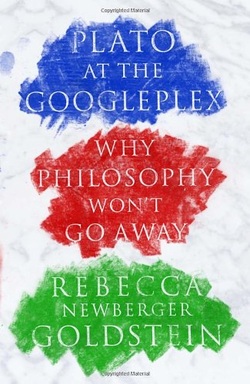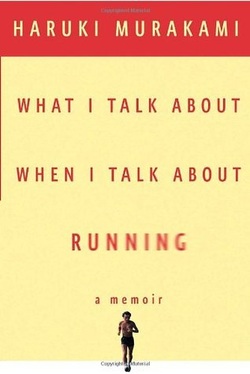 Plato at the Googleplex: Why Philosophy Won’t Go Away by Rebecca Newberger Goldstein. New York: Pantheon Books, 2014. Link is to the author’s website.
Plato at the Googleplex: Why Philosophy Won’t Go Away by Rebecca Newberger Goldstein. New York: Pantheon Books, 2014. Link is to the author’s website.
So . . .a 400+-page book on philosophy. Real promising, isn’t it? I hope I can persuade you to read it, even though parts of it are quite challenging and dense. Sometimes you finish a book with a feeling of satisfaction: “I made it through.” Sometimes with almost a sigh of relief: “So that’s what happened!” But once in a great while, at least for me, there’s a feeling of regret: “Now I won’t get to be in the company of these characters any more.” And that’s how I felt about the character of Plato in this book. Suddenly I realized, “Oh no! I’m almost finished, and I don’t want to be. I want to go along with Plato into more of our modern world, hearing his take on all sorts of other situations.” I hope I can get across in this post what a charming, gracious, focused person Plato is in this book.
He is never defensive. He is never offensive, or offended. Of course, he’s the creation of the author, whom I’d never heard of and whose other books I’m now planning to read. Her characterization is so compelling that I’m led to believe that this is what Plato must have been like. (I can’t say the same about the character of Socrates and must confess to skipping several sections dealing with him as a historical figure. Maybe if Goldstein had written some scenes with him in the modern world, as she does with Plato, I would have read those.)
Goldstein has done something extremely original which sounds obvious and contrived: She has Plato visit our modern world in five different contexts, interspersing those chapters with historical ones dealing with real events and characters in the past. In our time Plato gives a speech at Google’s headquarters (the Googleplex, from whence the title) and at the 92nd Street Y in New York City, on a panel with a Freudian child psychologist and a tiger mother. He goes on a cable news talk show with an obvious (and somewhat unfair) version of Rush Limbaugh, he helps out an advice columnist with his philosophical take on love, and he visits a neurology lab where he argues that there is a self beyond the synapses.
 What I Talk About when I Talk About Running by Haruki Murakami, Borzoi Books, 2008. Link is to the book’s page on the author’s website, which is seriously cool.
What I Talk About when I Talk About Running by Haruki Murakami, Borzoi Books, 2008. Link is to the book’s page on the author’s website, which is seriously cool.
How I ended up reading and then writing about this book is a long story. My son Gideon reads a lot of modern fiction, partly because he wants to become a modern fiction writer himself and partly because he seems to be drawn to seriously weird stuff. I would say, on the basis of my having opened one Murakami novel and read one paragraph that he fits into that category, but perhaps my sample size was small. Anyway, recently I was showing Gideon some postings on The Happiness Project website, mainly to ask him where Gretchen Rubin gets her images. As we scrolled through the pages, her post about this book and author came up. “Hey, that’s . . . that guy you don’t like,” he said. Well, maybe I didn’t want to read his novels, but the quotations from this book sounded interesting, so I got it from the library. (If all readers are like me and very rarely buy books, then the publishing industry is indeed doomed.) Although I didn’t quite finish it, I found this book to be entrancing. Murakami’s personality is hard to describe. Very dry and matter of fact, very detached. Able to stand back and observe himself objectively. Actually, he reminds me quite a bit of the character of Plato in the Goldstein book. So when I was complaining to Gideon that I hadn’t read any books this week that would qualify for the website he said, “Why don’t you do the Murakami book?” Here it is, then.The main concept in this book is the interplay between desire and will, something I’m very focused on myself. On the one hand, he says, and I agree, that “I don’t think it’s merely willpower that makes you able to do something. The world isn’t that simple. To tell the truth, I don’t even think there’s that much correlation between my running every day and whether or not I have a strong will. I think I’ve been able to run for more than twenty years for a simple reason: It suits me. . . . Human beings naturally continue doing things they like, and they don’t continue what they don’t like” (44). But that doesn’t mean that there aren’t plenty of mornings when Murakami doesn’t want to get out there and do it. It’s a matter of realizing where your desire really lies. I had a boyfriend once who said that he thought the hardest thing in the world is to do what you really want to do. There’s something to that. But once you find that something and latch onto it, then you can really move forward.
One more quotation: “Just as I have my own role to play, so does time. And time does its job much more faithfully, much more accurately, than I ever do. Ever since time began (when was that, I wonder?), it’s been moving ever forward without a moment’s rest” (121). Maybe it’s because I’m 62, but I’m becoming more and more conscious of time’s passing. Murakami is right—it never stops.